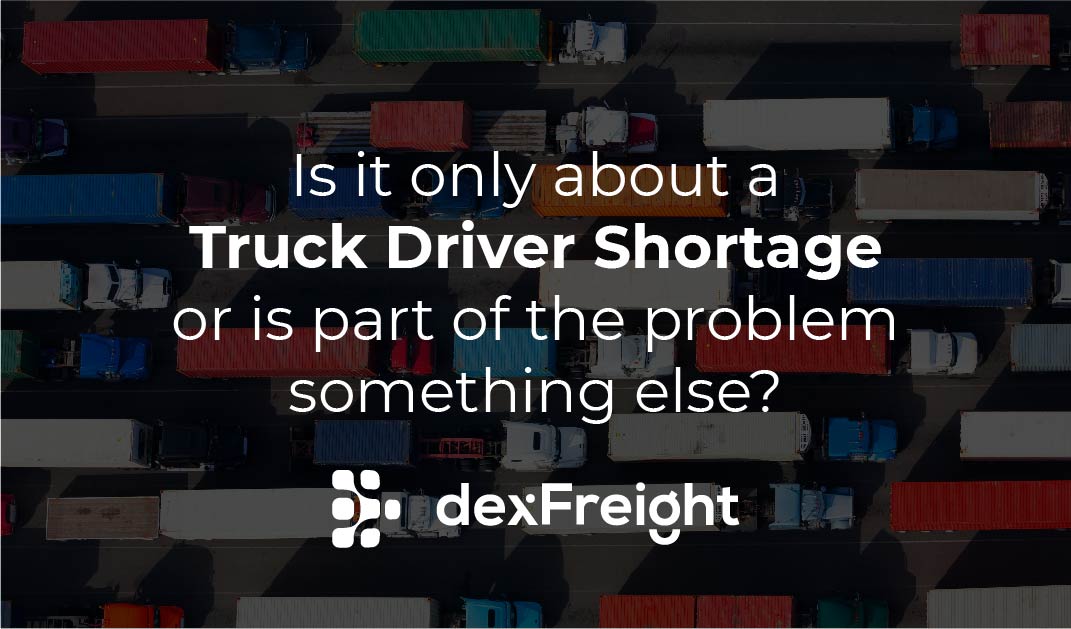As a professional who has been in the transportation industry for over 30 years, I’ve been asking myself for a long time why trucking has a driver shortage? Are drivers not paid enough? Is the job too hard and disrespected? Or is it possible that inefficiencies in the way our industry operates play a significant role in increasing the need for more drivers?
The industry’s current need for drivers is not in dispute. The latest Driver Shortage Update from the American Trucking Associations released this past October estimates the shortage has hit a historic high of just over 80,000 drivers. Based on employment trends and projected growth in freight volume, it added that the number could double by 2030. ATA also cites a number of causes for the shortage and rightfully states that there is no single way to fix it.
There are some very viable solutions to the driver shortage, such as improving retention through better pay, benefits and amenities programs; attracting non-traditional drivers, and even licensing 18 to 20 year old drivers to haul interstate freight. One thing that’s not being discussed, however, is the waste inherent in current freight transportation operations that makes it impossible to achieve full utilization of available capacity.
To discuss that further, it’s important to understand the situation and the costs. In its Analysis of the Operational Costs of Trucking: 2021 Update, the American Transportation Research Institute (ATRI) reported that 138,930 truck-tractors and 418,520 trailers of varying types traveled over 12 billion vehicle miles in 2020, and that the average cost per mile among motor carriers that year was $1.646. The report also indicated that 20.6% of those miles were run empty.
Those 2.472 billion empty miles, it added, “put a serious strain on for-hire fleet efficiency, as these miles accrue operational costs without a direct customer revenue offset.” The empty miles in this case can be converted to costs easily—at $1.646 per mile it represents more than $4 billion in unnecessary spending annually.
Any trucking entity that wants to add up its losses from empty mileage or empty seats can also consider the cost of lost revenue. The TCA Profitability Program (TPP) cites a normal gross revenue range of $3,000 to $5,000 per week. According to Cargo Transport Alliance, LLC, a global transportation network, the average gross per truck is between $4,000 and $10,000 per week.
At the end of the day, it’s going to take a collaborative solution to resolve the inefficiencies in freight transportation as well as the driver shortage that continues to get so much attention. But instead of continuing to recruit drivers and add trucks, which only compounds the driver problem, maybe we need to focus on assuring that existing trucks are utilized more efficiently and productively.
To that end, digital freight network provider Convoy is promoting a cooperative approach with a new program that provides brokers direct access its owner-operator and small carrier network, saying that improves productivity through automation. The company’s partnership with a major freight carrier that worked on the program, it said, “exemplifies how freight industry collaboration can benefit all parties — carriers, shippers, and brokers.”
In a blog from project44, the argument is made that its supply chain visibility platform acts as “connective tissue” between transportation providers, third-party logistics companies, and shippers. “It binds together supply chain partners into a system and provides a framework so they can all communicate and collaborate to support the supply chain as a whole. In doing so, it unites a fragmented supply chain and solves the problem of supply chain partners using disparate systems and software.”
I applaud the message that these two companies and others are sending, and I wholeheartedly agree that addressing the fragmentation that is inherent in the industry, the siloed businesses and solutions that operate inefficiently, is the key to solving this problem.
Collaboratively, we could agree on using one operating system so all available trucks and loads are visible to everyone. Unfortunately, this will never happen. Many top-tier shippers, brokers, and carriers have too much invested in their own systems to make that change.
An alternative that all stakeholders could agree on is to create a decentralized, neutral platform that augments workflows while allowing businesses to continue using their own enterprise and transportation management systems. Smaller companies that don’t have those solutions could participate as well by using the decentralized network in a fully digital environment.
Blockchain technology allows us to create that kind of more efficient solution. It enables businesses to share data while retaining the privacy of information. It fosters real optimization that brings value to each individual entity and the industry collectively.
Also, other solutions can be built on top of that type of platform by any participant, allowing for impactful optimization that accounts for other variables such as driver Hours of Service, road congestion, weather, loading times, and more. Considering all those factors ensures the best decisions are made.
There is no doubt that trucking is one of the most important industries in the U.S. According to ATA it represents 80.4% of the nation’s freight bill and is responsible for 72.5% of total domestic tonnage.
Optimizing freight transportation operations and networks by sharing information safely through decentralized platforms, blockchain, and smart contracts is a clear path to utilizing the industry’s existing capacity much more effectively and productively. It is a game-changing approach that can be extremely impactful as our economy continues to grow. Instead of adding more trucks and drivers let’s work together to utilize the ones we have more efficiently.
Jim Handoush
President & CEO, dexFreight


